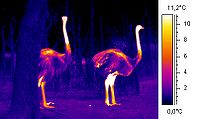
Photo from wikipedia
Knowledge of thermal stress biology for most tropical fish species in reef ecosystems under climate change is still quite limited. Thus, the objective of this study was to measure the… Click to show full abstract
Knowledge of thermal stress biology for most tropical fish species in reef ecosystems under climate change is still quite limited. Thus, the objective of this study was to measure the time-course changes of thermal stress biomarkers in the commercially exploited coral reef fish Amphiprion ocellaris, during a laboratory simulated event of increased temperature. Heat shock protein 70kDa (Hsp70) and total ubiquitin (Ub) were determined in the muscle (lethal method) and in the fin (non-lethal alternative method) under two temperature treatments (control - 26°C and elevated temperature - 30°C) throughout one month with weekly samplings. Results suggest that biomarker basal levels are tissue-specific and influence the degree of response under temperature exposure. Responses were highly inducible in the muscle but not in fin tissue, indicating that the latter is not reliable for monitoring purposes. Thermal stress was observed in the muscle after one week of exposure (both biomarkers increased significantly) and Ub levels then decreased, suggesting the animals were able to acclimate by maintaining high levels of Hsp70 and through an effective protein turnover. In addition, the results show that mortality rates did not differ between treatments. This indicates that A. ocellaris is capable of displaying a plastic response to elevated temperature by adjusting the protein quality control system to protect cell functions, without decreasing survival. Thus, this coral reef fish species presents a significant acclimation potential under ocean warming scenarios of +4°C. Monitoring of thermal stress through a non-lethal method, fin-clipping, although desirable proved to be inadequate for this species.
Journal Title: Comparative biochemistry and physiology. Part A, Molecular & integrative physiology
Year Published: 2017
Link to full text (if available)
Share on Social Media: Sign Up to like & get
recommendations!